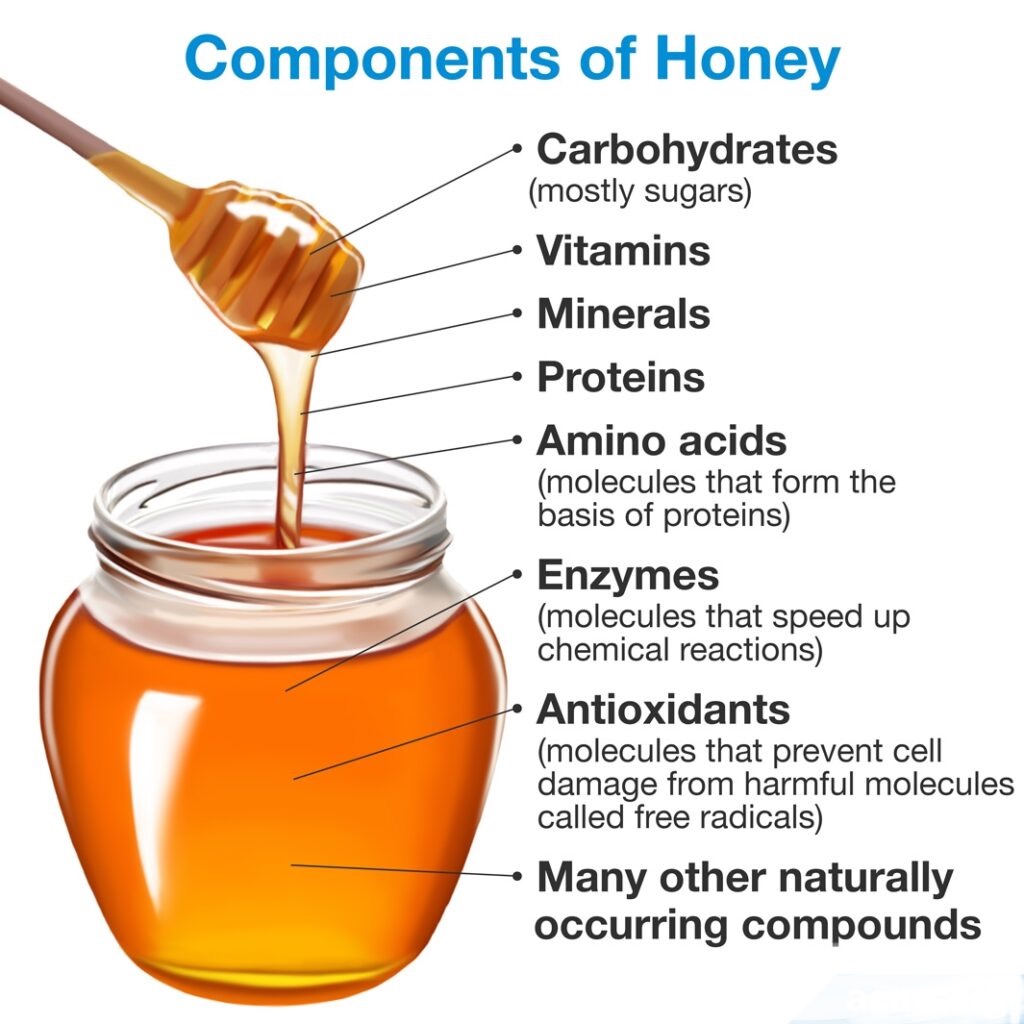Honey, a naturally sweet substance, has been used by people for thousands of years, dating back to the Neolithic era. Across the world, honey has played a role in various medical traditions, including Greek, Egyptian, Indian, Roman, Babylonian, Chinese, Mayan, and Islamic medicine. The benefits of honey are also highlighted in the Qur’an and Sunnah, as Allah ﷻ describes it as a healing for people in Surah Nahl, ayah 68-69:
وَأَوْحَى رَبُّكَ إِلَى النَّحْلِ أَنِ اتَّخِذِى مِنَ الجِبَالِ بُيُوتًا وَمِنَ الشَّجَرِ وَمِمَّا يَعْرِشُونَ ثُمَّ كُلِىۡ مِنۡ كُلِّ الثَّمَرٰتِ فَاسۡلُكِىۡ سُبُلَ رَبِّكِ ذُلُلًا ؕ يَخۡرُجُ مِنۡۢ بُطُوۡنِهَا شَرَابٌ مُّخۡتَلِفٌ اَلۡوَانُهٗ فِيۡهِ شِفَآءٌ لِّلنَّاسِ ؕ اِنَّ فِىۡ ذٰ لِكَ لَاٰيَةً لِّقَوۡمٍ يَّتَفَكَّرُوۡنَ
“And your Lord inspired to the bee, “Take for yourself among the mountains, houses [i.e., hives], and among the trees and [in] that which they construct. Then eat from all the fruits and follow the ways of your Lord laid down [for you].” There emerges from their bellies a drink, varying in colors, in which there is healing for people. Indeed in that is a sign for a people who give thought.” (Qur’an 16:68-69)
Traditional use of honey has been found for burns and wounds. It is also beneficial for lung diseases, eye conditions, skin disorders, gastrointestinal issues, and oral ailments. Some other effective properties of honey include anti-cancerous, anti-inflammatory, and anti-bacterial. Due to its carbohydrate content, honey is an excellent energy source. Fructose, one of the main carbohydrates in honey, has been shown to have an anti-diabetic effect and to reduce gastric emptying time. The oligosaccharides in honey promote the growth of beneficial gut flora, acting as a probiotic and improving gut health. In the hadith collections of al-Bukhari and Jami-Tirmidhi, the Prophet ﷺ recommended honey as a remedy for stomach diseases, as narrated by Abu Sa’id al-Khudri رضي الله عنه:
“A man came to the Prophet ﷺ and said, “My brother has some Abdominal trouble.” The Prophet ﷺ said to him “Let him drink honey.” The man came for the second time and the Prophet ﷺ said to him, ‘Let him drink honey.” He came for the third time and the Prophet ﷺ said, “Let him drink honey.” He returned again and said, “I have done that ‘ The Prophet ﷺ then said, “Allah has said the truth, but your brother’s `Abdomen has told a lie. Let him drink honey.” So he made him drink honey and he was cured.” (Saheeh al-Bukhari: 5684, 5716; Jami Tirmidhi: 2082)
Research has established that the vitamins in honey are beneficial for cardiovascular protection and antioxidant activity. The antioxidant properties of honey are largely due to the presence of phenols, though these can vary depending on factors like type of flower, environmental conditions, and the species of bees. These phenolic compounds are also responsible for antibacterial, antioxidant and antiviral effects of honey. Flavonoids in honey are most important for their cytotoxic activity, minimize inflammation and the risk of cardiovascular diseases. Terpenes, though present in small amounts, contribute to honey’s anti-cancer, antioxidant, and antimicrobial properties. The pollen in honey also has antimicrobial properties and can improve general fertility of humans. Daily consumption of honey provides a sufficient serum concentration of minerals, which promotes anti-diabetic effects and improves the overall endocrine function, which in turn has many beneficial effects in the human body. The Prophet ﷺ said:
“If anyone licks honey three mornings every month, he will not be afflicted with any serious trouble.” (Mishkat al-Masabih: 4570)
Honey is considered the oldest known wound healing agent because of its antibacterial, antioxidant, anti-inflammatory, and anti-viral effects. The high amount of sugar, low dissolved oxygen, moderate viscosity, high antioxidant levels, low protein content, acidic pH, and the formation of hydrogen peroxide contribute to its antimicrobial effects. Hydrogen peroxide present in honey also acts as a preservative. Honey is also suggested to be effective in treating asthma, dry mouth, toothache, period pain, measles, ophthalmic conditions, and some neurological disorders like anxiety and depression (Rehman & Majid, 2020). In a hadith narrated by Ibn Abbas رضي الله عنه (Saheeh al-Bukhari: 5680-5681, 5683) and Jabir ibn Abdullah رضي الله عنه (Saheeh al-Bukhari: 5702) in a hadith transmitted in Saheeh al-Bukhari that the Prophet ﷺ said:
“Healing is in three things: A gulp of honey, cupping, and branding with fire (cauterizing). But I forbid my followers to use (cauterization) branding with fire.”
In conclusion, as suggested by the Qur’an and Sunnah, honey is highly beneficial in many therapeutic ways and has significant nutritional value. Regular consumption of honey can protect a person from a wide range of diseases, promoting a balanced and healthy life. Truly, as Allah ﷻ said, honey indeed is a healing for people.
Written by: Attiya Amir
References
Abu Abdullah Muhammad bin Ismail bin Ibrahim bin al-Mughira al-Ja’fai (832). Medicine: Cupping to treat unilateral or bilateral headache, Saheeh al-Bukhari (Hadith 5702). Dar ibn Kathir. https://sunnah.com/bukhari:5702
Abu Abdullah Muhammad bin Ismail bin Ibrahim bin al-Mughira al-Ja’fai (832). Medicine: There is cure in three things, Saheeh al-Bukhari (Hadith 5681-5681, 5683). Dar ibn Kathir. https://sunnah.com/bukhari:5682
Abu Abdullah Muhammad bin Ismail bin Ibrahim bin al-Mughira al-Ja’fai (832). Medicine: The treatment for a person suffering from diarrhea, Saheeh al-Bukhari (Hadith 5716). Dar ibn Kathir. https://sunnah.com/bukhari:5716
Abu Abdullah Muhammad bin Ismail bin Ibrahim bin al-Mughira al-Ja’fai (832). Medicine: Treatment with honey, Saheeh al-Bukhari (Hadith 5684). Dar ibn Kathir. https://sunnah.com/bukhari:5684
Imam Abu `Isa Muhammad at-Tirmidhi (883). Chapters on Medicine: What Has Been Related About Treating With Honey, Jami’ at-Tirmidhi (Hadith 2082). Darussalam. https://sunnah.com/tirmidhi:2082
Muhammad ibn Abd Allah Khatib at-Tabrizi (1122). Medicine and Spells: Section 3, Mishkat al-Masabih (Hadith 4570). Maktabat ul Bushra. https://sunnah.com/mishkat:4570
Rehman, M. U., & Majid, S. (2020). Therapeutic Applications of Honey and its Phytochemicals. Cham, Switzerland: Springer. https://www.researchgate.net/publication/347804921_Antiproliferative_and_Apoptotic_Activities_of_Natural_Honey
Umm Muhammad (1997). Surah 16: an-Nahl (The Bee), The Qur’an With Surah Introductions And Appendices Saheeh International Translation (Page 221, Verse 68-69). dar Abul Qasim. https://www.kalamullah.com/Books/Quran%20-%20Saheeh%20International%20Translation%20.pdf





